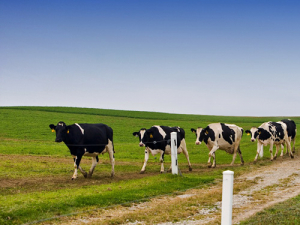Dairy products led a rise in total exports in October, but meat and offal exports were down from the same month last year, Statistics New Zealand says.
In October 2016, total goods exports rose $85 million (2.2%). Dairy exports rose $122 million (13%) to $1.1 billion. Butter rose $61 million (29%) and milk powder rose $57 million (12%).
“We exported more butter for a higher price this month than October last year,” international statistics manager Jason Attewell says. “We also exported more milk powder, but prices were similar.”
In October, meat and edible offal exports, our second-largest export commodity group, fell $71 million (18 percent) from October 2015. Beef and lamb exports to the key market of China were down.
Other significant commodity group changes were forestry products, up $74 million (25%), and fruit, up $42 million (40%), led by kiwifruit (up $33 million).
The monthly trade balance was a deficit of $846 million (22% of exports). Excluding one-off imports, the monthly trade deficit was $592 million.
For the year ended October 2016, the annual trade deficit was $3.3 billion.











